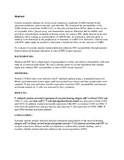| dc.description.abstract | To evaluate if systemic murine malarial infection enhances HIV susceptibility through parasite-induced mucosal immune alterations at sites of HIV sexual exposure.
BACKGROUND::
Malaria and HIV have a high degree of geographical overlap, and interact substantially with each other in co-infected individuals. We used a murine model to test the hypothesis that malaria might also enhance HIV susceptibility at sites of HIV sexual exposure.
METHODS::
Female C57/BL6 mice were infected with P. chabaudi malaria using a standardized protocol. Blood, gastrointestinal tissues, upper and lower genital tract tissues and iliac lymph nodes were sampled 10 days post-infection, and the expression of putative HIV susceptibility and immune activation markers by T cells was assessed by flow cytometry.
RESULTS::
P. chabaudi malaria increased expression of mucosal homing integrin α4β7 on blood CD4+ and CD8+ T cells, and these α4β7+ T cells had significantly increased co-expression of both CCR5 and CD38. In addition, malaria increased expression of the HIV co-receptor CCR5 on CD4+ T cells from the genital tract and gut mucosa, plus mucosal T cell expression of CD38, MHC-II and CD69 immune activation markers.
CONCLUSION::
Systemic murine malaria infection induced substantial upregulation of the mucosal homing integrin α4β7 in blood, as well as gut and genital mucosal T cell immune activation and HIV co-receptor expression. Human studies are required to confirm these murine findings, and to examine whether malaria infection enhances the sexual acquisition of HIV. | en |

